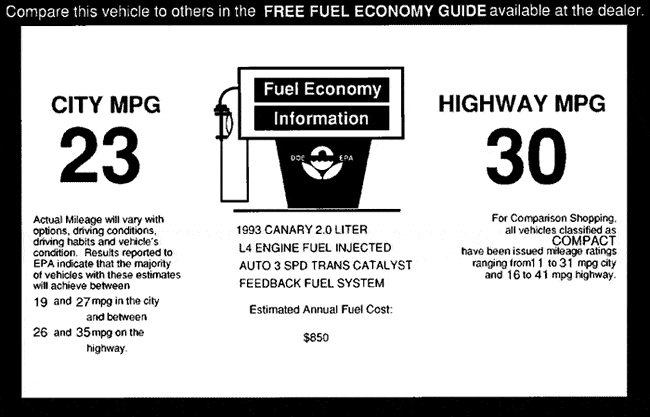 Earlier this week, General Motors announced the upcoming 2010 Chevy Volt would get 230 mpg (Mike wrote about it on SSC, Will the Chevy Volt really get 230 miles per gallon?). That headline made my eyes pop. Could a new hybrid vehicle from GM beat out its closest competitor, the Toyota Prius, by over four times? That would be quite the engineering feat.
Earlier this week, General Motors announced the upcoming 2010 Chevy Volt would get 230 mpg (Mike wrote about it on SSC, Will the Chevy Volt really get 230 miles per gallon?). That headline made my eyes pop. Could a new hybrid vehicle from GM beat out its closest competitor, the Toyota Prius, by over four times? That would be quite the engineering feat.
Well, it appears it’s actually more mathematical shell game, then flat out energy efficiency. At least that’s what I can tell after a few minutes of research, surfing some recent articles and, most interestingly, reading plenty of (mostly negative) feedback posted about GM’s claim.
It seems most agree the 230 mpg figure is not fair since it does not compare apples to apples. When Toyota claims the Prius makes 50 mpg, it is based on the standard EPA definition of miles per gallon, which is intended to allow consumers to fairly evaluate the energy efficiency of autos from different manufacturers. With the Chevy Volt, however, the EPA calculation becomes trickier, requiring assorted definitions especially related to the term “average”. The reason? If you drive the Volt less than forty miles per day, you would use no gas, since the electric motor can do the job. After forty miles, the combustion engine needs to kick in to support the additional range.
According to an informative CNET article, the EPA issued a statement on the matter:
The EPA also put out a statement on Tuesday saying that it has not tested the Volt for mileage yet and “cannot confirm the economy values claimed by GM.” GM said that its mileage estimate, including triple digit combined city and highway driving, was based on a draft methodology developed by the EPA.
So, all these tantalizing mileage numbers are based on a draft methodology, and, further, make assumptions based on the average consumer’s driving behavior. This is a challenge that the EPA and the Department of Energy will continue to face as the miles-per-gallon measure quickly becomes less relevant as more hybrid and electric vehicles hit the streets. A new calculation, based on some metric of energy consumption, is needed.
One suggestion is to use the number of kilowatt-hours required to drive 100 miles. This would possibly be a step in the right direction.
For now, though, the current numbers are misleading. As the CNET article points out, according to GM’s 230 mpg claim, that vehicle should therefore be over four times more efficient than the Toyota Prius. But it is not.
I scanned a variety of user comments mostly complaining on the CNET web site and others. A few interesting points jumped out.
One person questioned how much electricity would be needed to charge the Volt. And also noted that the electricity should be factored into the energy efficiency rating of the vehicle. After all, electricity needs to come from somewhere, and since, this person theorized, most electricity in the U.S. is generated by coal plants, wouldn’t that be equally bad, and how is this considered “green”? Someone else suggested new hybrids and electric cars be mandated to include average annual costs similar to that of new major appliances.
Another idea from a commenter: GM should offer solar-based recharge systems.
The controversy continues.
As we migrate to new forms of the combustion engine, electric or otherwise, we must also rethink how we measure and communicate efficiency.


